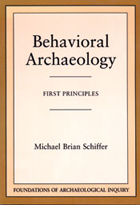Paper: 978-0-87480-501-7
Behavioral archaeology is an emerging branch of anthropology emphasizing the study of relationships between human behavior and artifacts (material culture) in all times and places. As such, it aspires to make contributions beyond the confines of archaeology to other behavioral sciences and to society in general.
Behavioral Archaeology is a selection of writings by Michael Schiffer, one of the field’s primary proponents. The chapters include important works published between 1972 and 1987, the formative period of behavioral archaeology. Schiffer has crafted a lengthy introduction to the coume, a personal history that contextualizes the development of these works. Also new is the last chapter, which lists—and keys to the preceding chapters—the field’s most important principles, tenets, and premises.
Readers will discover that although behavioral archaeologist have put archaeological inference on a scientific footing and have fostered the growth of experimental archaeology and ethnoarchaeology as research strategies, behavioral archaeology is not confined to methodology.
Indeed, cultivation of the fields established here is leading to the development of new behavioral science focused on studies of people-artifact interactions. By closely juxtaposing method and theory, principles and applications, science and history, this book illustrates the coherence and scope of behavioral archaeology’s conceptual framework.
See other books on: Archaeology | Behavioral Archaeology | Schiffer, Michael Brian | Social Science
See other titles from University of Utah Press












